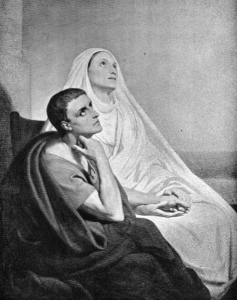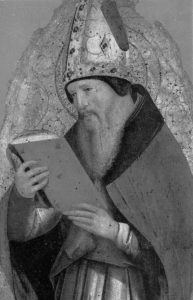Back to series



"Servant of Servants Of The God"
Click here to open a Print - Friendly PDF
Augustine wrote his Confessions when he was about forty-three years old, after he had become bishop of Hippo (in modern-day Algeria).
In that autobiographical account he tells the story of his first thirty-three years—his birth, childhood, rebellious youth, ambition, travel to Rome and Milan, conversion, his mother’s joining him in Italy, their time together in Cassiciacum, their return journey south to North Africa, and his mother’s death en route at Ostia on the Tiber. Peter Brown writes, “What Augustine remembered in the Confessions was his inner life; and this inner life is dominated by one figure—his mother.”1
Augustine wrote Confessions some ten years after the death of his mother, and “time can soften and beautify.”2 In Augustine’s case, it undoubtedly did; there are hints of the strains they experienced from time to time, largely because of the son’s rejection of Christianity and the mother’s unrelenting persistence in prayer and advice.3 Their relationship was intensely human, “reflecting some of the deepest emotions of life, not superficial nor artificial.”4
By the time Augustine wrote about his mother, however, he briefly mentioned their tense times and mostly remembered the good—and there was much good to remember. In the Confessions, Augustine explained that he did not include “innumerable things” that God had done for him, but he did speak often of his mother.
In his description of her, we see a saint in the biblical meaning of the word.5 B.B. Warfield has written, Augustine’s “mother . . . was one of nature’s noblewomen, whose naturally fine disposition had been further beautified by grace.”6
Her name, Monica, probably had Berber origins. The Berbers were the earliest known inhabitants of the western Mediterranean coast of Africa.7 As for many coastal Berbers, her culture was Latin. She was born into a believing household and brought up in the teachings and practice of the second-century African church.
From her childhood she developed within her own family something of a “saintly” reputation. But on one occasion at least she almost lost it. The story lived on, and, perhaps like all good stories, improved with the telling. Augustine includes it in his Confessions.
As a young girl Monica developed a taste for wine (she would take a few sips from the family cask and on occasion drank furtively) but quit when a jealous slave girl in the household accused her of being a “boozer.” A sentence in the Confessions indicates that Monica did not give up drinking entirely: “Her spirit was not obsessed by excessive drinking, and no love of wine stimulated her into opposing the truth” (6,2).8
Monica married Patricius, a person of some standing but little money in the small town in which they lived, probably no better or worse than most of his contemporaries. He was proud of his gifted son and was prepared to sacrifice to enable him to have a good education.
Augustine records his father’s satisfaction when one day at the public baths he saw that the boy was showing “signs of virility” (2,6)—a development that would cause Augustine no end of trouble. Describing a time when he was about thirty years old, he wrote, “I thought I would become very miserable if I were deprived of the embraces of a woman” (6,20).
 Patricius was not a Christian. He was often kind, although he had a quick temper. He was unfaithful to his wife, but Monica loved him and put up with his failings. Augustine wrote that “she rendered obedient service to him, for in this matter she was being obedient to your [God’s] authority” (1,17).
Patricius was not a Christian. He was often kind, although he had a quick temper. He was unfaithful to his wife, but Monica loved him and put up with his failings. Augustine wrote that “she rendered obedient service to him, for in this matter she was being obedient to your [God’s] authority” (1,17).
Later he wrote that Monica “tried to win him for you, speaking to him of you by her virtues through which you made her beautiful, so that her husband loved, respected and admired her” (9,19).
Before Patricius died, Monica’s quiet witness bore good fruit, and he came to Christ. Augustine says little about his father in the Confessions, although in Book 9 he acknowledges Patricius not only as his earthly father but as a brother in Christ in the church and fellow citizen “in the eternal Jerusalem” (9,37).9
Monica’s mother-in-law, who lived with them, was hostile to her until Monica won her over “by her respectful manner and by persistence in patience and gentleness” (9,20). Monica, Augustine wrote, whenever she could “reconciled dissident and quarreling people” (9,21). Moreover, she was, he said to God, “a servant of your servants: any of them who knew her found much to praise in her, held her in honour and loved her; for they felt your presence in her heart” (9,22).
Monica was probably twenty-three when Augustine was born, her first of several children. “She was already a Christian in the noblest sense,” wrote Handley Moule, “strong in the power of spiritual holiness, and ardently prayerful” for the salvation of her children.10 She suffered greatly when she saw Augustine wandering away from God.
During his rebellious years, Augustine said that God was not silent but spoke to him through his mother. “Then whose words were they but yours which you were chanting in my ears through my mother, your faithful servant?” (2,7).
Monica witnessed to her wayward son and prayed for him and wept for him “more than mothers weep when lamenting their dead children” (3,19). Nine years before Augustine’s conversion, Monica received the famous consolation from a bishop, wearied with her entreaties for him to reason with her son, “Go . . . it cannot be that the son of these tears should perish.” She took those words “as if they had sounded from heaven” (3,21).
Monica was distraught when Augustine planned to leave Carthage for Rome. She feared that away from her influence and the restraints of home, he would be lost to her and to God. To escape he deceived her.
“I lied to my mother—to such a mother—and I gave her the slip.” “By her flood of tears,” Augustine wrote, “what was she begging of you, my God, but that you would not allow me to sail? Yet in your deep counsel you heard the central point of her longing” (5,15). God did not answer Monica’s prayer—that Augustine not go to Rome—so that he could answer her prayer that her son would come to Christ.
After accusing Augustine of “deception and cruelty,” Monica turned again to pray for him (5,15). And soon she followed him to Milan, where he had gone to further his career in rhetoric. There she found him “in a dangerous state of depression” because he “had lost all hope that truth could be found” (6,1). But Monica was confident that she would live to see her son come to faith in Christ.
With Augustine in Milan was the woman (we don’t know her name) he had lived with faithfully for fifteen years and their son, Adeodatus, unwanted but then deeply loved. Monica and Augustine’s friends insisted that she be sent back to Carthage so that Augustine could marry a proper wife of social standing.
The parting was exquisitely painful on both sides. Augustine wrote that “his heart was cut and wounded, and left a trail of blood” (6,25). Monica worked hard to find a wife for Augustine—one of sufficient income and from a good family.
It all came to nothing. Monica and Augustine acted within the cultural expectations of the time—but it is disappointing that Monica’s lifelong Christian experience and Augustine’s spiritual pilgrimage, soon to lead to Christian conversion, did not produce a different, and more compassionate, result.

In Milan, Augustine came under the power and influence of the great preacher Ambrose, at first because of “the charm of his language” (5,23).
Monica loved Ambrose, Augustine wrote, “as an angel of God when she knew that it was through him that I had been brought to that state of hesitancy and wavering” (6,1). Ambrose praised Monica. “When he saw me,” Augustine wrote, “he often broke out in praise of her, congratulating me on having such a mother” (6,2).
Augustine was converted in Milan in AD 386, when, moved by a child’s words “pick up and read, pick up and read,” he opened Paul’s letter to the Romans and found by God’s grace the very text that he needed: “Not in riots and drunken parties, not in eroticism and indecencies, not in strife and rivalry, but put on the Lord Jesus Christ, and make no provision for the flesh, in its lusts” (8,29).
At the age of thirty-two, Augustine was saved by God’s grace; “late have I loved you,” he wrote (10,38). Monica’s prayers were answered. It was her “faith, hope, and love” that served “as signs and instruments by which God guided Augustine to his destiny.”11
After his conversion, Augustine went to a country villa at Cassiciacum, near Lake Como, where he enjoyed the loveliness of God’s “evergreen paradise” (9,5). With him was a group of friends and Monica, who, wrote Augustine, “stayed close by us in the clothing of a woman but with a virile faith, an older woman’s serenity, a mother’s love and a Christian devotion” (9,8).
At Cassiciacum, during the months between his conversion and baptism, Augustine wrote his first books, as he, with his friends and mother, explored the nature of wisdom, the mystery of the Trinity, and the question of evil. Monica is always referred to in these writings as “mother,” representing, as she did, the teachings of the Christian church.
Although some have questioned Monica’s contribution to the discussions, she was, wrote Handley Moule, a woman “who might have shone at any period for intellectual gifts.”12
At the end of The Happy Life, one of his books from this time, Augustine wrote that his mother recalled one of the hymns of Ambrose (all of which she greatly loved), “Help, O Trinity, those that pray,” and he added: “Indeed, this is undoubtedly the happy life, that is, the perfect life which we must assume that we can attain soon by a well-founded faith, a joyful hope, and an ardent love.”13
Augustine, his mother, and some others, including his son and brother, left northern Italy to return to Africa. Their journey was interrupted when the threat of war forced them to remain in Italy at the seaport of Ostia.
The narrative portion of the Confessions culminates and practically ends with the remarkable conversation Augustine had with his mother at Ostia, in which “they fairly scaled heaven together in their ardent aspirations.”14 Standing at a window that overlooked the garden in the courtyard of the house where they were staying, they talked about heaven.
“Forgetting the past and reaching forward to what lies ahead” (Phil. 3:13), we were searching together in the presence of the truth which is you yourself. We asked what quality of life the eternal life of the saints will have, a life which “neither eye has seen nor ear heard, nor has it entered into the heart of man” (1 Cor. 2:9).
But with the mouth of the heart wide open, we drank in the waters flowing from your spring on high, “the spring of life,” which is with you. Sprinkled with this dew to the limit of our capacity, our minds attempted in some degree to reflect on so great a reality. (9,23)
 A few days later Monica died.15 Augustine was devastated. He wrote, “Now that I had lost the immense support she gave, my soul was wounded, and my life as it were torn to pieces” (9,30). He held back his tears, feeling that he should not weep for Monica, as he had for friends who had died, because his mother had died in God’s grace and so now lived without want.
A few days later Monica died.15 Augustine was devastated. He wrote, “Now that I had lost the immense support she gave, my soul was wounded, and my life as it were torn to pieces” (9,30). He held back his tears, feeling that he should not weep for Monica, as he had for friends who had died, because his mother had died in God’s grace and so now lived without want.
He went to the baths (supposed to ease the mind by washing away anxiety) but found that the water did not help. That night in bed he remembered a psalm-based hymn written by Ambrose—“Creator of all things. You rule the heavens. You clothe the day with light and night with the grace of sleep.”
The tears that he had been holding back streamed down, and he let them flow as freely as they would, making of them a pillow for his heart. His grieving heart found rest in God and through God in “a bed of tears shed for an earthly love.”16
Many times in his Confessions Augustine thanked God for his mother and praised her Christian character. She was:
...liberal in almsgiving, obedient and helpful in serving your saints, letting no day pass without making an oblation at your altar, twice a day at morning and at evening coming to your Church with unfailing regularity, taking no part in vain gossip and old wives’ chatter, but wanting to hear you in your words [in the Bible] and to speak to you in her prayers. (5,17)
But Monica’s piety, Augustine came to understand, was not the result of inherent goodness or successful striving; it was God’s gift—received, not achieved.
He ended his tribute to his mother by acknowledging that she was a sinner saved by grace. His mother, Augustine wrote, would confess that “her debts have been forgiven by him to whom no one can repay the price which he, who owed nothing, paid on our behalf” (9,36). It was not her good works but God’s great grace (about which Augustine would write so much) that made Monica the Christian she was.

Monica, “this most celebrated of Christian mothers,” writes Bishop Moule,17 is known as the mother of the great Augustine; it is equally true, however, that Augustine should be remembered as the son of Monica. He wrote that she “brought me to birth both in her body so that I was born into the light of time, and in her heart so that I was born into the light of eternity” (9,17).
Notes:
1. Peter Brown, Augustine of Hippo: A Biography (Berkeley: University of California Press, 1969), 29. Practically all Augustine scholars pay similar tribute to Monica. An exception is Garry Wills who says little in his Saint Augustine (Penguin, 1999) about Augustine’s mother until her death, claiming that “too much is often made of her role in Augustine’s life” (57).
2. Warren Thomas Smith, Augustine: His Life and Thought (Atlanta: John Knox Press, 1980), 10.
3. Michael Marshall has written, “Surely we could be forgiven in a post-Freudian age for seeing some destructive aspects in such an overbearing mother figure who frankly pursued Augustine, not unlike the Hound of Heaven, down the corridors of the first thirty-three years of his life.” The Restless Heart: The Life and Influence of St. Augustine (Grand Rapids: Eerdmans, 1987), 19.
3. Smith, Augustine, 79.
4. She also became a saint in the Catholic sense, with her own day in the church’s calendar, at first May 4, fittingly enough the day before the church observed the feast of Augustine’s conversion. In recent years her feast day was moved to August 27, when Monica is remembered as the patron of Christian mothers.
5. Benjamin Breckinridge Warfield, Studies in Tertullian and Augustine (New York: Oxford University Press, 1930), 254.
7. In the oldest manuscript of the Confessions, the spelling is Monnica.
8. Saint Augustine, Confessions, trans. Henry Chadwick (Oxford: Oxford University Press, 1992). All quotations from the Confessions are taken from the Chadwick translation, followed by the book and paragraph number.
9. By Book 9 of the Confessions, Augustine had come to a more balanced and realistic view of both parents. He realized that he was the ungrateful son of an overly possessive mother and a too-worldly father, but he had come to know and love them both.
10. H.G.C. M[oule], “Monnica, St.” in A Dictionary of Christian Biography, ed. William Smith and Henry Wace (London: John Murray, 1882), 3:932.
11. Kin Paffenroth and Robert P. Kennedy, eds., A Reader’s Companion to Augustine’s Confessions (Louisville, KY: Westminster John Knox, 2003), 94.
12. Moule, “Monnica, St.,” 933.
13. The Fathers of the Church (New York: CIMA, 1948), 5:84.
14. Warfield, Studies, 269.
15. Part of the inscription over her tomb was found in 1945 by some boys playing by a church in Ostia.
16 Paffenroth and Kennedy, Reader’s Companion, 149.
17. Moule, “Monnica, St.,” 932.

David B. Calhoun
ProfessorDavid B. Calhoun, (1937-2021) was Professor Emeritus of Church History at Covenant Theological Seminary in St. Louis, Missouri. A minister of the Presbyterian Church in America, he has taught at Covenant College, Columbia Bible College (now Columbia International University), and Jamaica Bible College (where he was also principal). Calhoun has served with Ministries in Action in the West Indies and in Europe and as dean of the Iona Centres for Theological Study. He was a board member (and for some years president) of Presbyterian Mission International, a mission board that assists nationals who are Covenant Seminary graduates to return to their homelands for ministry.

 COPYRIGHT: This publication is published by C.S. Lewis Institute; 8001 Braddock Road, Suite 301; Springfield, VA 22151. Portions of the publication may be reproduced for noncommercial, local church or ministry use without prior permission. Electronic copies of the PDF files may be duplicated and transmitted via e-mail for personal and church use. Articles may not be modified without prior written permission of the Institute. For questions, contact the Institute: 703.914.5602 or email us.
COPYRIGHT: This publication is published by C.S. Lewis Institute; 8001 Braddock Road, Suite 301; Springfield, VA 22151. Portions of the publication may be reproduced for noncommercial, local church or ministry use without prior permission. Electronic copies of the PDF files may be duplicated and transmitted via e-mail for personal and church use. Articles may not be modified without prior written permission of the Institute. For questions, contact the Institute: 703.914.5602 or email us.
-
Recent Podcasts
Ralph Waldo Emerson’s Philosophy and Influence
by David George Moore on July 26, 2024Ralph Waldo Emerson was a gifted nineteenth century...Read More
-
The Side B Stories – Nate Sala’s Story
by Jana Harmon, Nate Sala on July 19, 2024
-
Terrorism Through the Eyes of Faith
by Dennis Hollinger on July 12, 2024
-
Recent Publications
Hasn’t Science Proven That Belief in God Is an Outdated Superstition?
by Sharon Dirckx on July 1, 2024Many assume that scientific practice and belief in...Read More
-
Has the Bible Been Corrupted as Some Muslims Claim?
by Andy Bannister on June 1, 2024
-
Seeing Jesus Through the Eyes of Women
by Rebecca McLaughlin on May 15, 2024
0
All Booked
0.00
All Booked
0.00
All Booked
22194
C.S. Lewis’s The Abolition of Man Live Online Small Group 8:00 PM ET
https://www.cslewisinstitute.org/?event=c-s-lewiss-the-abolition-of-man-study-course&event_date=2024-10-02®=1
https://www.paypal.com/cgi-bin/webscr
2024-10-02

Next coming event
Days
Hours
Minutes
Seconds
C.S. Lewis’s The Abolition of Man Live Online Small Group 8:00 PM ET
On October 2, 2024 at 8:00 pmTags
Speakers

David B. Calhoun
Professor
Team Members

David B. Calhoun
ProfessorDavid B. Calhoun, (1937-2021) was Professor Emeritus of Church History at Covenant Theological Seminary in St. Louis, Missouri. A minister of the Presbyterian Church in America, he has taught at Covenant College, Columbia Bible College (now Columbia International University), and Jamaica Bible College (where he was also principal). Calhoun has served with Ministries in Action in the West Indies and in Europe and as dean of the Iona Centres for Theological Study. He was a board member (and for some years president) of Presbyterian Mission International, a mission board that assists nationals who are Covenant Seminary graduates to return to their homelands for ministry.





